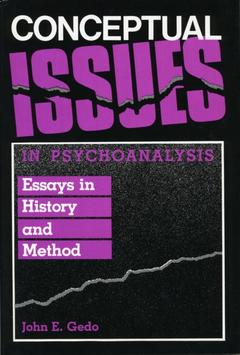Description
Conceptual Issues in Psychoanalysis
Essays in History and Method
Author: Gedo John E.
Language: English
Keywords
heinz; kohut; historical; section; ego; psychology; meta; oedipus; complex; melanie; Vincent Van Gogh; Overburden; Freud's Tripartite Model; Chronic; Viennese; Follow; Postwar; Baroque; War Neuroses; Clinical Practice; General Paresis; Optimal Frustration; Infant Behavior; Kleist's Essay; Narcissistic Personality Disturbance; Psychoanalytic Drive Theory; Freud's Character; Empirical Investigators; Attention Cathexis; Primary Analytic Model; Narcissistic Libido; Repressed Helplessness; Foreign Marriage; Patient's Adaptive Capacities; Don Quijote
Approximative price 64.97 €
Subject to availability at the publisher.
Add to cartPublication date: 06-1986
Support: Print on demand
Approximative price 66.48 €
In Print (Delivery period: 14 days).
Add to cartPublication date: 01-2019
· 15.2x22.9 cm · Paperback
Description
/li>Contents
/li>Readership
/li>Biography
/li>
In Conceptual Issues in Psychoanalysis, John Gedo's mastery of Freudian theory and broad historical consciousness subserve a new goal: an understanding of "dissidence" in psychoanalysis. Gedo launches his inquiry by reflecting expansively on recent assessments of Freud's character. His acute remarks on the intellectual and personal agendas that inform the portraits of Freud offered by Frank Sulloway, Jeffrey Masson, and Peter Swales pave the way for his own definition of psychoanalysis in historical context. Then, in topical studies on Sandor Ferenczi, Melanie Klein, and Heinz Kohut, he explicates the commonalities that bind together three generations of dissidents, each of whom undertook to supplant the edifice of hypotheses erected by Freud with alternative theories. Interspersed with these essays are quite insightful studies of Lou Andreas-Salome and David Rapaport, whom Gedo sees as "epistemological referees" attempting to reconcile viewpoints unique to their generations.
In the second part of the book, Gedo argue that analysis now has the opportunity to move beyond this pattern of dissidence followed by mediation by drawing on observational research about infancy and early childhood to validate or refute its clinical hypotheses. In these chapters, Gedo offers critical commentary on recent efforts to extrapolate from infant research to the psychoanalytic theory of development. Only then does he offer his own measured estimation of the "legacy of infancy and the technique of psychoanalysis." This review of "the challenge of scientific method" as it bears on analysis culminates in concluding chapters that probe the status of analysis as a hermeneutic discipline and the contribution of analysis to "vocabularies of moral deliberation."
1. Fluctuat Nec Mergitur I. Historical Section 2. Sigmund Freud's Character and the Definition of Psychoanalysis 3. Sandor Ferenczi: The First Psychoanalytic Dissident 4. The Loyal Opposition of Louise von Salome 5. Kant's Way: The Epistemological Challenge of David Rapaport 6. The Doctrine of Melanie Klein: Vitalism, Innate Ideas, and the Subversion of Reason 7. A Hero of Our Time: The Dissidence of Heinz Kohut 8. Barred from the Promised Land: Heinz Kohut in the Wilderness 9. The Lesson of History and the Challenge of the Scientific Method II. Methodological Section 10. Caveat Lector: Psychoanalytic Theory and the Direct Observation of Behavior 11. On the Dawn of Experience: The Past Recaptured 12. The Legacy of Infancy and the Technique of Psychoanalysis 13. Relevance or Reductionism in Interpretation: A Reprise of the Psychoanalysis of Kleist's Pupper Theater 14. Epiloge: More on the Essence of Psychoanalysis: Self-Creation and Vocabularies of Moral Deliberation
John E. Gedo, M.D., retired in 1990 as Training and Supervising Analyst, Chicago Institute for Psychoanalysis. He is the author of numerous books for Analytic Press, including The Biology of Clinical Encounters (1991) and The Mind in Disorder (1998).
These books may interest you

The Languages of Psychoanalysis 40.18 €



